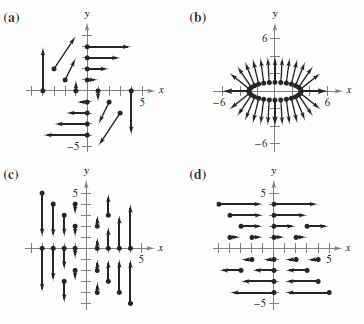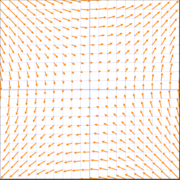Calculus III Advanced (Course) (15.01) (Homework)
Contents
- 1 Section 15.1 Homework
- 2 Internal Links
Section 15.1 Homework
From Calculus 10e by Larson and Edwards, p. 1049. Exercises 1, 2, 3, 4, 8, 34, 40, 44, 60.
Exercises 1-4 Matching
Match the vector field with its graph in Figure 1.
Exercise 15.1.1 Matching
- \(\textbf{F}(x,y)=y\textbf{i}\)
Solution d
Exercise 15.1.2 Matching
- \(\textbf{F}(x,y)=x\textbf{j}\)
Solution c
Exercise 15.1.3 Matching
- \(\textbf{F}(x,y)=y\textbf{i} - x\textbf{j}\)
Solution a
Exercise 15.1.4 Matching
- \(\textbf{F}(x,y)=x\textbf{i} + 3y\textbf{j} \)
Solution b
Exercise 15.1.8 Sketching a Vector Field
Find \( \| \textbf{F} \| \) and sketch several representative vectors in the vector field.
- \( \textbf{F}(x,y) = y\textbf{i}+x\textbf{j}\)
Solution
Exercise 15.1.34 Finding a Potential Function
Determine if the vector field is conservative. If so, find a potential function for the vector field.
- \(\textbf{F}(x,y) = 3x^{2}y^{2}\textbf{i}+2x^{3}y\textbf{j}\)
Solution Applying Theorem 15.1.1 yields that \(\textbf{F}\) is not conservative because
- $$ \frac{\partial}{\partial y}[3x^{2}y^{2}] = 3x^{2}2y \text{ and }\frac{\partial}{\partial x}[2x^{3}y]=6x^{2}y$$
Exercise 15.1.40 Finding a Potential Function
Determine if the vector field is conservative. If so, find a potential function for the vector field.
- $$\textbf{F}(x,y) = \frac{x\textbf{i}+y\textbf{j}}{x^{2}+y^{2}}$$
Solution The vector field \(\textbf{F}\) is not conservative because
- $$\frac{\partial}{\partial x}=\frac{-x^{2}-2xy+y^{2}}{(x^{2}+y^{2})^{2}} \text{ and }\frac{\partial}{\partial y}=\frac{-y^{2}-2x+y^{2}}{(x^{2}+y^{2})^{2}} $$
Exercise 15.1.44 Finding the Curl of a Vector Field
Find curl F for the vector field at the given point.
- \(\textbf{F}(x,y,z) = x^{2}z\textbf{i}-2xz\textbf{j}+yz\textbf{k}; \: (2,-1,3)\)
Solution
| curl \( \{x^{2}z,-2xz,yz\}\) | \(= (2x+z,x^{2},-2z)\) |
| \(= (2(2)+3)\textbf{i}-2^{2} \textbf{j}+(-1)(3) \textbf{k}\) | |
| \(=7-4-3=0 \) |
Exercise 15.1.60 Finding the Divergence of a Vector Field
Find the divergence for the vector field \(\textbf{F}\).
- \(\textbf{F}(x,y,z)=\ln(x^{2}+y^{2})\textbf{i}+xy\textbf{j}+\ln(y^{2}+z^{2})\textbf{k}\)
Solution
- $$\text{div}\ln(x^{2}+y^{2})\textbf{i}+xy\textbf{j}+\ln(y^{2}+z^{2})\textbf{k}= \frac{2x}{x^{2}+y^{2}}+x+\frac{2z}{y^{2}+z^{2}} $$
Internal Links
Parent Article: Calculus III Advanced (Course)

